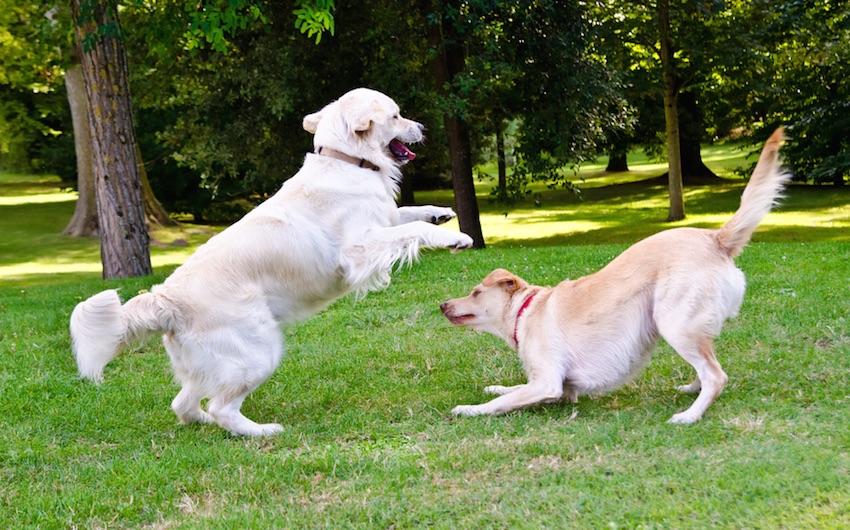Dogs Mimic Their Pals' Playful Behaviors

While playing, dogs mimic their furry pals more often than they copy strangers — a behavior that could reveal more about how dogs became man's best friend, researchers say.
Mimicking behavior may underlie what scientists call emotional contagion, a basic form of empathy where one shares others' emotions. In people, chimpanzees, orangutans and other primates, emotional contagion is linked to facial mimicry, a fast automatic response where they involuntarily mimic others' expressions.
Like primates, dogs are social animals — they use their eyes, lips, teeth, heads, tails and bodies in communicative ways. As such, researchers wanted to see if dogs also experienced rapid mimicry. [Like Dog, Like Owner: What Breeds Say About Personality]
Scientists filmed 49 dogs as they played in a dog park in Palermo, Italy. The scientists noted playful behavior, such as when the dogs kept their mouths relaxed and open, or when they carried out a "play bow," crouching on their front legs while standing on their hind legs and perhaps wagging their tails and barking.

"I think that natural conditions are extremely important if we want to reveal a phenomenon as really it is," said study lead author Elisabetta Palagi, a sociobiologist at the University of Pisa in Italy. "Lab studies are very important, but lab conditions can inhibit some behaviors."
The research team recorded the canines with the permission of their owners. They also asked the owners what kinds of bonds each dog had with other dogs — whether they were "friends" that lived near each other and interacted three or more times per week, "acquaintances" that saw each other no more than twice a month, or strangers that had never interacted before.
For the first time, researchers discovered the presence of rapid mimicry in dogs. They found that dogs mimicked playful interactions more rapidly and strongly than other behaviors, such as jumps or bites. Moreover, playful sessions interspersed with rapid mimicry lasted longer than ones without it. [Video: Watch the Dogs Mimic Playful Behaviors]
Sign up for the Live Science daily newsletter now
Get the world’s most fascinating discoveries delivered straight to your inbox.
In both humans and other animals, mimicry is often biased toward others who are more similar, familiar or socially close. As such, the researchers expected rapid mimicry would be more frequent between friends.
Indeed, Palagi and her colleagues found that friends mimicked each other more than they mimicked strangers. The stronger the friendship, the higher the level of rapid mimicry, they found.
"Everybody is infected by others' smiles and laughter if the trigger is a friend," Palagi told Live Science.
Previous research found that dogs can recognize humans' emotional facial expressions and body postures, and that human yawns can also unleash dog yawns. The researchers of the new study suggested that potential dog empathy with humans could shed light on how people domesticated dogs.
"Further research should focus on the demonstration of rapid mimicry in wolves, to evaluate if the phenomenon in dogs has been shaped by the domestication process," Palagi said.
The scientists detailed their findings Dec. 23 in the journal Open Science.
Follow Charles Q. Choi on Twitter @cqchoi. Follow us @livescience, Facebook&Google+. Original article on Live Science.










